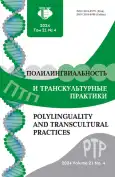In the “Dim” Light of Ethnicity. Poetry of Mari Gennady Sabantsev-Oyar
- Authors: Arzamazov A.A.1,2
-
Affiliations:
- Kazan Scientific Center of the Russian Academy of Sciences
- RUDN University
- Issue: Vol 21, No 4 (2024)
- Pages: 683-699
- Section: LITERARY SPACE
- URL: https://journal-vniispk.ru/2618-897X/article/view/326891
- DOI: https://doi.org/10.22363/2618-897X-2024-21-4-683-699
- EDN: https://elibrary.ru/DLRXVS
- ID: 326891
Cite item
Full Text
Abstract
The study discusses the artistic features of the poetic work of Gennady Oyar, who is one of the most prominent representatives of modern Mari literature. The poems included in the collection “Flashes of the Heart” are analyzed in the context of the realities of the formation and development of Mari literature, taking into account the stage-typological specificity of the Finno-Ugric literatures of Russia. The motive-figurative cluster of Gennady Oyar’s works is examined, and the conclusion is drawn that his creative statements are deeply philosophical, actualizing universal human themes. It has been established that the poet in his poems “misses” a number of promising strategies that are important from the point of view of the implementation of his own creative concept, so the folklore and mythological component, going back to the traditional beliefs of the Mari, is poorly represented in Oyar’s figurative and symbolic system. At the same time, it was revealed that Gennady Oyar in his poetry pays great attention to the process of returning the historical truth of the Mari, without which the truthful construction of ethno-humanitarian intellectual reality is impossible. The work examines ethnically relevant topics and characters (the fate of the native language, the national intelligentsia, the tragedy of the poet and actor Yyvan Kyrli). The quality of the literary translation of Gennady Oyar’s texts into Russian is assessed. It is emphasized that his work corresponds with the main trends in the development of Mari literature at the turn of the 20th - 21st centuries.
About the authors
Aleksey A. Arzamazov
Kazan Scientific Center of the Russian Academy of Sciences; RUDN University
Author for correspondence.
Email: arzami@rambler.ru
ORCID iD: 0000-0001-7577-5917
SPIN-code: 9789-1083
Doctor of Philology, Head of the Laboratory of Multifactorial Humani-tarian Analysis and Cognitive Philology, Kazan Scientific Center of the Russian Academy of Sciences; Professor of the Department of Russian Studies, Ethnic-Oriented Pedagogy and Digital Didactics, Institute of Russian Language, RUDN University
2/31 Lobachevsky St, Kazan, 420111, Republic of Tatarstan, Russian Federation;6 Miklukho-Maklaya St, Moscow, 117198, Russian FederationReferences
- Kudryavtseva, R.A., Starygina, N.N., Lyubimov, N.I. et al. 2022. Modern Mari lyrics: artistic models of the world and the poetics of creative individuality: collective monograph. Yoshkar-Ola: Mariiskii gosudarstvennyi universitet publ. Print. (In Russ.)
- Arzamazov, A.A., 2022. Mari-Udmurt poetic parallels and contrasts. Comparative reading experience. Kazan: Izdatel’stvo Akademii nauk Tatarstana publ. Print. (In Russ.)
- Shafranskaya, E.F., and G.T. Garipova. 2022. Local texts in Russian literature. Moscow: Yurait publ. Print. (In Russ.)
- Safiullin, Ya.G. 2021. From romanticism to comparison of literatures. Kazan: Izdatel’stvo Instituta yazyka, literatury i iskusstva publ. Print. (In Russ.)
- Kudryavtseva, R.A., Belyaeva, T.N., Shkalina, G.E. et al. 2019. Axiological paradigm of Mari literature of the 20th–21st centuries: collective monograph. Yoshkar-Ola: Mariiskii gosudarstvennyi universitet publ. Print. (In Russ.)
- Naldeeva, O.I. 2013. Modern Mordovian poetry: main trends and artistic guidelines: monograph. Saransk: Mordovckii gosudarstvennyi pedagogicheskii institute publ. Print. (In Russ.)
- Sultanov, K.K. 2019. Angle of refraction. Literature and identity: the communicative aspect. Moscow: IMLI RAS publ. Print. (In Russ.)
- Zagidullina, D.F. 2018. Tatar poetry and prose at the turn of the XXth–XXIst centuries: aesthetic guidelines and artistic searches: monograph. Kazan: Tatarskoe knizhnoe izdatel’stvo publ. Print. (In Russ.)
- Dampilova, L.S. 2016. Spiritual and cultural codes in the poetry of the Mongolian peoples. Irkutsk: Ottisk publ. Print. (In Russ.)
- Bakhtikireeva, U.M. 2005. Creative bilingual personality: national Russian-speaking writer and features of his Russian literary text. Moscow: Triada publ. Print. (In Russ.)
- Manaeva-Chesnokova, S.P. 2004. The artistic world of modern Mari poetry: monograph. Yoshkar-Ola: Mariiskii nauchno-issledovatel’skii institut yazyka, literatury i istorii publ. Print. (In Russ.)
- Gatsak, V.M. 2000. “Folklore memory of tradition: Levels and forms of ethnopoetic constancy.” Bulletin of the Dagestan Scientific Center, no. 8, pp. 95–103. (In Russ.)
Supplementary files









